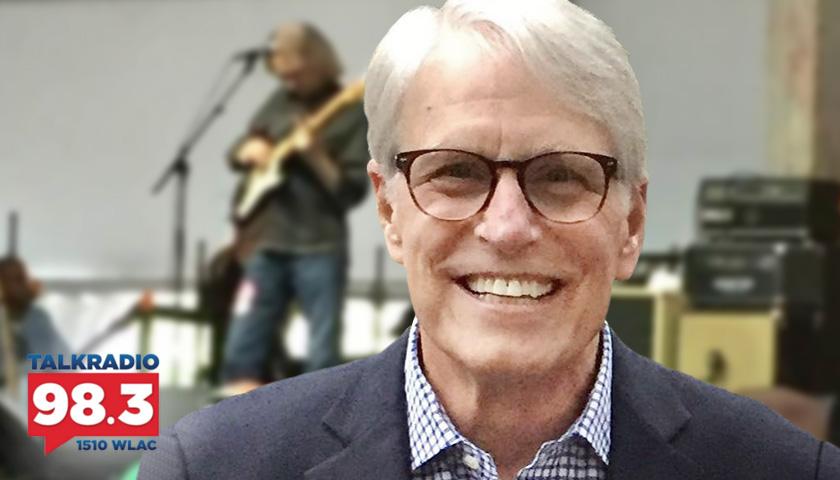Live from Music Row, Monday morning on The Tennessee Star Report with Michael Patrick Leahy – broadcast on Nashville’s Talk Radio 98.3 and 1510 WLAC weekdays from 5:00 a.m. to 8:00 a.m. – host Leahy welcomed co-founder and president of the American Freedom Foundation, former music artist manager, Ted Hacker in studio to discuss his background and what motivated him to make the career change.
Leahy: Right now in studio, the co-founder and president of the American Freedom Foundation based here in Nashville, Mr. Ted Hacker. Good morning, Ted.
Hacker: Good morning, Michael Patrick, how are you?
Leahy: I’m delighted to have you in here. I didn’t know about American Freedom Foundation, but it’s a great organization on the web at Americanfreedomfoundation.org. We’ll get into, your background and how you get, you got started. But you’ve got an event coming.
Thursday and Friday, April 27th and 28th at the Gaylord Opryland Resort and Convention Center all day, each day. And it’s basically to help veterans, transitioning service members, and military families get a job.
Hacker: That’s correct. They’re really excited about this. We’re partnering with Quad A, which is the Army Aviation Association of America at their annual event. And they allowed us to present this event to help veterans with their transition from military to civilian life and to find jobs.
Leahy: And attendance is free for veterans, military service members, and military families. You co-founded American Freedom Foundation how long ago?
Hacker: We started about 18, 19 years ago. And my partner, the former sergeant major of the Army, the 12th Sergeant major of the Army, Jack L. Tilley, was on active duty and he took a bunch of music industry artists overseas to perform for the troops in Afghanistan, Kuwait, and Uzbekistan. And that’s how I met ’em and I went with them and we performed for the troops and we’ve been enjoyed together ever since.
Leahy: You enjoyed it. So the rest of the story, you’re originally from Pittsburgh, Pennsylvania.
Hacker: I am.
Leahy: You’re a Yankee like me.
Hacker: Yes.
Leahy: I grew up all around upstate New York. We ended up not too far from Pittsburgh, just in the Jamestown, New York area. Jamestown, Randolph, New York.
Hacker: Sure.
Leahy: That’s where I graduated from high school. But you came down here. Before you did this, now this is fascinating folks you had a career in the music industry.
Hacker: I did.
Leahy: You were an artist manager.
Hacker: Correct.
Leahy: And as we’re coming in, I discovered that you were the manager for a friend of mine’s group. Marty Rowe of Diamond Rio. What a great group.
Hacker: They were.
Leahy: We went to church with them for many years. And we know Marty and his wife, they’re really great people. But they were one of your, one of the groups that you managed, right?
Hacker: That is correct, yes. For a long time.
Leahy: Who were some of the other groups?
Hacker: I was involved with the Oak Ridge Boys and Daryl Worley and Mark Wills, BJ Thomas, and the Diamond Rio. A had a slew of ’em over those years.
Leahy: Did you manage BJ Thomas?
Hacker: Yes, I did.
Leahy: From when to when?
Hacker: 83 to 86 I guess it was. Yeah, I’ve been around a long time.
Leahy: So you have been around a long time. And you don’t look a day over 50. (Laughter)
Hacker: Oh, thank you.
Leahy: I don’t look a day over 50 either, folks. No, you don’t. Wink, wink. So you had a very successful career as an artist manager.
Hacker: I would think so. It was just a really great time in my life and I spent 36 years doing that.
Leahy: 36 years. And so what happened? Why did you decide to retire from that career and then set up American Freedom Foundation?
Hacker: I went overseas with Sergeant Major Tilley.
Leahy: That was it!
Hacker: That changed my life.
Leahy: What year was that?
Hacker: That was 2003 and 2002.
Leahy: Why did it change your life?
Hacker: Just to get over there and we didn’t go and just take a helicopter and drop into some nice area and stay in hotels. We were out actually staying on the bases, in tents, and eating in the mess halls and really seeing the service and the sacrifice that our veterans make for our service members make for our country. And it changed my life. And I wanted to devote the rest of my life to helping veterans and their families.
Leahy: At what point did you say, I’m going to make a change in my career? Were you there with them in Afghanistan and saying, I’ve got to do something different?
Hacker: It was shortly thereafter. We came back in 2003 and in 2004 we set up the foundation and we did a bunch of non-profit work for about three years. And then in 2007, I decided after 36 years of doing this I’m ready to do something else. And I really believe so much in what we were doing with the foundation.
Leahy: So the seed was planted?
Hacker: Yes.
Leahy: In 2003?
Hacker: Correct.
Leahy: You set it up. You were still doing your artist management. But then you said 2007, I’m doing this full-time, right? You’re all in.
Hacker: Yep.
Listen to today’s show highlights, including this interview:
– – –
Tune in weekdays from 5:00 – 8:00 a.m. to The Tennessee Star Report with Michael Patrick Leahy on Talk Radio 98.3 FM WLAC 1510. Listen online at iHeart Radio.
Photo “Ted Hacker” by Ted Hacker. Background Photo “50th New Orleans Jazz Festival” by Ted Hacker.




